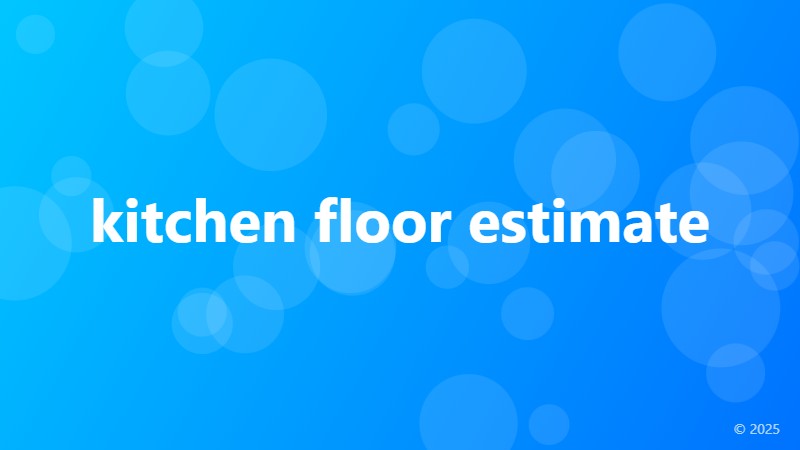kitchen floor estimate

Understanding the Cost of a New Kitchen Floor: A Comprehensive Estimate
Renovating a kitchen can be a daunting task, especially when it comes to estimating the cost of a new kitchen floor. With numerous options available, from hardwood to tile, and various factors affecting the final price, it's essential to have a clear understanding of what to expect. In this article, we'll provide a comprehensive kitchen floor estimate, breaking down the costs and considerations to help you plan your kitchen renovation project.
Flooring Options and Their Estimated Costs
When it comes to kitchen flooring, homeowners have a wide range of options to choose from, each with its unique characteristics, advantages, and price points. Here's a brief overview of popular kitchen flooring options and their estimated costs:
Hardwood Flooring: $5 - $20 per square foot, installed. Hardwood flooring is a popular choice for kitchens due to its durability, aesthetic appeal, and ease of maintenance.
Tile Flooring: $3 - $15 per square foot, installed. Tile flooring is another popular option, offering a wide range of styles, materials, and price points. From ceramic to porcelain, tile flooring can mimic the look of natural stone or provide a unique, decorative touch.
Laminate Flooring: $0.50 - $5 per square foot, installed. Laminate flooring is a cost-effective alternative to hardwood, offering a similar look and feel at a fraction of the cost.
Vinyl Flooring: $0.50 - $5 per square foot, installed. Vinyl flooring is a waterproof, low-maintenance option ideal for busy kitchens. It's available in a range of styles, from sheet vinyl to luxury vinyl tiles.
Factors Affecting the Cost of a Kitchen Floor
Beyond the type of flooring, several factors can impact the final cost of a kitchen floor. These include:
Room Size: The larger the kitchen, the more flooring material needed, resulting in higher costs.
Material Quality: The quality of the flooring material can significantly impact the final cost. High-end materials, such as exotic hardwoods or premium tile, will generally cost more than entry-level options.
Installation Complexity: The complexity of the installation process can also affect the final cost. For example, installing flooring around obstructions, such as kitchen islands or stairs, may require additional labor and materials.
Location and Labor Costs: The location of the project, as well as the cost of labor in your area, can also impact the final cost of the kitchen floor.
Getting an Accurate Kitchen Floor Estimate
To get an accurate kitchen floor estimate, it's essential to consider all the factors mentioned above. Here are some tips to help you get started:
Measure Your Kitchen: Take precise measurements of your kitchen to determine the amount of flooring material needed.
Research Flooring Options: Research different flooring options, considering factors such as durability, maintenance, and aesthetic appeal.
Get Multiple Quotes: Obtain quotes from multiple contractors or flooring suppliers to compare prices and services.
Consider Additional Costs: Factor in additional costs, such as underlayment, adhesives, and installation materials, to get a comprehensive estimate.
By understanding the costs involved and considering the factors that affect the final price, you can create a realistic kitchen floor estimate and plan your renovation project with confidence.